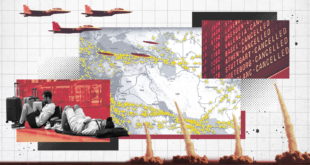KUT — For thousands of years fishermen have drawn their livelihoods out of the brown waters of the mighty Tigris and Euphrates rivers, which teem with species found nowhere else in the world.
But now — as overlapping civil wars grip much of Iraq — outlaws equipped with pesticides, handgrenades and electric cables are driving the country’s fisheries to extinction and leaving local fishermen with empty nets.
“Iraq’s fish are suffering from these terrible crimes,” said Faiq Salim, one of the oldest fishermen in the central Iraqi town of Kut, 175 kilometres downriver from Baghdad.
“Fishermen are using poison  and pesticides and electric cables and        handgrenades,” reminiscent of methods adopted by many Lebanese in the eastern Mediterranean during their 1975-1990 civil war, he complained.
“They are desperate for work, outside the law, and without any concern for their actions because of the absence of anyone policing them,” added Salim, whose family has fished the Tigris River for generations.
Before the US-led invasion in 2003, Salim used to pull in 30 or 40 fish a day, but now says he is lucky to catch three. “Fishermen today are no longer able to provide for their families because of these crimes against them.” Kut’s fishermen used to net 450 tonnes of fish a week, but in recent years that number has dwindled to less than 30 tonnes, according to statistics compiled by the agriculture ministry’s local office.
Under Saddam Hussein’s dictatorship, authorities brought the same heavy hand to bear on the fishing industry that they brought to everything else, requiring fishermen to carry licences and providing them with officially approved nets.
Now, skyrocketing unemployment is driving more and more upstart fishmongers into the business and — with local enforcement hamstrung by its war with militias and insurgents — many ignore time-honoured codes of conservation.
“These practices are against fishing laws,” said Fadil Jaafari, another fisherman. “Many of these new fishermen deliberately fish during the high season between the middle of February and the beginning of April.” “But the professional fishermen don’t fish during this season so that their livelihood will last after that period. They don’t violate the law.” Unchecked fishing has drained local stocks, leading many to wonder about the future of the industry. “What is happening now in front of the eyes of government officials is dangerous,” said Hani Mohammad, a fish seller.
“These terrible practices are supplying huge amounts of fish to local markets and driving the fish to extinction,” he added.
At the same time, overall demand for fish has plummeted amid reports that dozens of victims of the sectarian bloodletting in and around Baghdad are being dumped in the Tigris.
“The number of customers has gone way down, and many have given up eating fish because of the stories circulating that the fish eat rotting human flesh,” said Muhanad Ali, another fishmonger.
“Most people now prefer farmed fish,” he added.
Others worry about the possible health consequences of the new fishing methods, particularly the pesticides.
“If the government does not go after these outlaws that use poisons and explosives they will put the lives of thousands of people in danger,” said fisherman Ali Said.
Until then, the fishmongers, like nearly everyone else in the largely ungoverned country, are appealing to local religious leaders to stem the chaos.
Sheikh Ahmed Radi, a local cleric, has declared that fishing with poisons, explosives, or electric cables is a “sin” because it threatens fisheries with extinction and endangers human health.
He called on local officials to “enforce the law and take serious action to hold those accountable who commit these acts”. Meanwhile, old-time fishermen say the old methods work best and they prefer the standardised nets of Saddam’s regime to the bombs and chemicals that have been poured into the river in the war’s aftermath.
“The best way to fish is with the nets that we used to get from the government. They came in different sizes, depending on what you wanted to catch,” said Said.Â
 Eurasia Press & News
Eurasia Press & News


